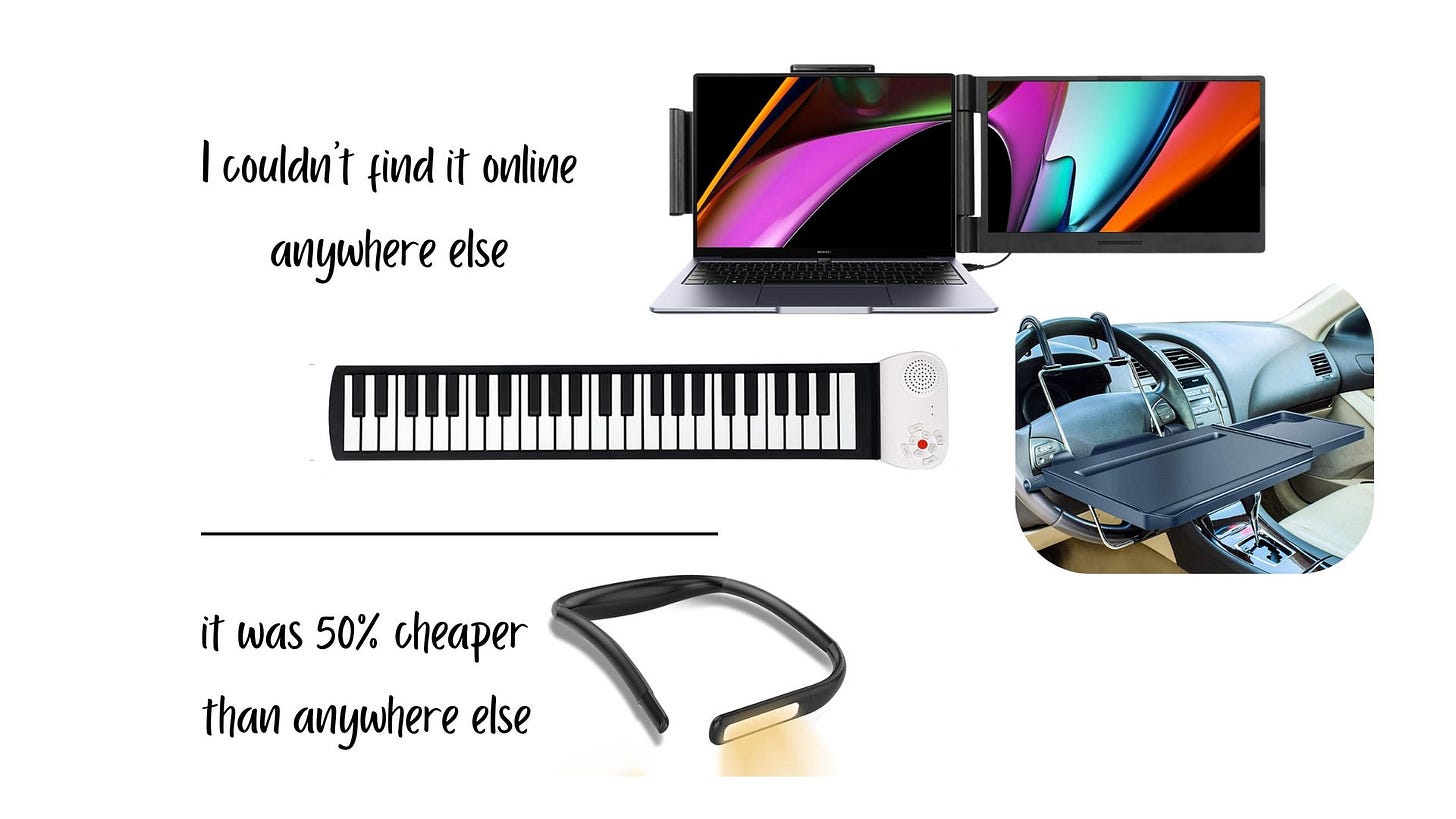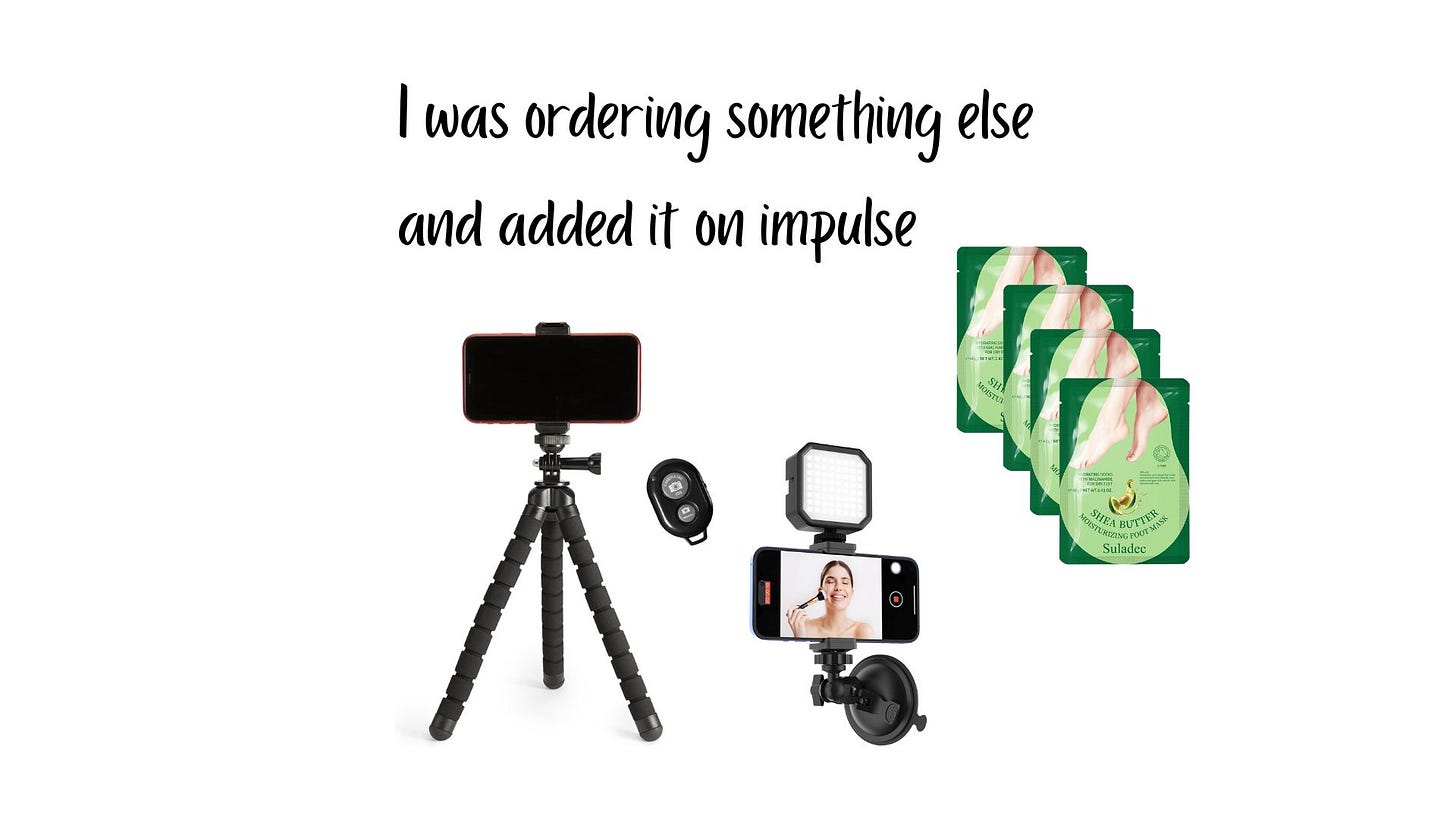Convenience, Compromise, and the Cart
What six months of Amazon orders revealed about habit, privilege, and trying to do better without doing it all
We’re almost a week past Prime Day - well, Prime Days, as they are now - and I noticed something fascinating this year from the influencers I follow: every single one prefaced their round-ups and affiliate links with some version of, “You don’t need this, but…”
I mostly follow socially conscious creators, many of whom have under 100,000 followers, so maybe this is just a reflection of my bubble. Still, something feels different this year. Even when people are shopping on Amazon, there’s more hesitation - more of a desire, or at least an intention, to be mindful about it.
Like many others, I’m trying to shop less from Amazon. (Virginia Sole-Smith and Corinne Fay explored a No-Amazon January challenge and devoted a whole podcast episode in February to how they felt about it afterwards!) Will any of us single-handedly bring down Bezos and the broligarchs by doing this? Of course not. Dana Miranda of You Don’t Need a Budget has a thought-provoking post on Substack subtitled “Amazon is terrible but you’re not terrible for shopping there” that I pops into my mind frequently.
She makes an important point: capitalism is fundamentally incompatible with any sort of Kantian compass. As she writes, “a universally moral choice almost never exists. If it does, it’s inaccessible for most of us and unreasonable to expect of anyone.” That resonates. We’re not bad people for shopping there. And yet…
I bristle a bit at the word “anyone.” Not because it’s wrong, exactly, but because it invites a kind of ethical passivity. Sole-Smith and Fay go out of their way to avoid sounding judgmental, emphasizing that quitting Amazon isn’t realistic - or even desirable - for everyone. “We are not at all trying to suggest this is any kind of moral high ground,” they write, “or something everyone needs to do.”
But I do think it’s fair to say that some of us, especially those with relative privilege and flexibility, can do more than we do. Not always, not for everything, but often. Miranda writes, “I don’t believe any of us shops on Amazon because we’re careless, rabid consumers. We shop on Amazon because it’s the option we’ve been given.” But I’d argue that my bubble - of mostly sub/urban and financially stable women - is careless more often than we’d like to admit. If we added just a little more thought, and especially forethought, to when, where, and why we shop, we might find that alternatives are often both available and accessible.
I’m certainly not pure. I own a Kindle (used mostly for library books), and we watch Prime Video regularly. In the first half of 2025, I placed seven Amazon orders. Looking back, it’s interesting to categorize them: the poor-planning panic buys, the impossible- or hard-to-find-elsewhere items, and the purchases that were more about poor impulse control than actual need.
Unsurprisingly, most of the “poor planning” purchases were kid-related. Two days before school restarted after winter break, I realized we were missing almost all of the lunchbox ice packs. A few weeks later, we were mysteriously down to two water bottles. Then I forgot until the last minute that Claire needed small toys for the graduating kindergarteners’ good-luck bags.
The ground anchor screws for a swing set at my parents’ house fall into this category, too. I did check Ace Hardware - no luck - and probably could have found something at Home Depot or Lowe’s, but I didn’t plan ahead and I was desperate for a safe way to burn off Claire’s energy now.

Then there were the things I genuinely tried to find elsewhere but couldn’t: the clip-on laptop screen and the car desk (thank you, Marina and Catherine), and a roll-up piano Robbie needed for group lessons. I did track down that neck lamp on another site, but it was literally twice the price. Like I said, I’m not pure.
And then, predictably, there were the impulse buys: foot masks I threw in with the ice packs, and a tripod and suction cup that found their way into my cart while I was still riding high from the very functional, justifiable car desk and screen extender. That’s Amazon’s whole business model in action.
So where does that leave me? Not with a vow to never shop there again, but with a more honest understanding of why I do. Sometimes it really is the only reasonable option. But, more often, it’s just the easiest one. And if I can recognize that in myself - and interrupt it, even occasionally - I’ll consider that progress. Not perfect, not performative. Just a small shift toward spending more in line with my values.
I’m not linking to any of the items I mentioned here - not because I’m trying to virtual signal, though it reads that way to my overthinking mind, but because it feels a little counter to the point of this post. If something really resonates and you want a non-affiliate link, you can always ask.






I’ve worked to reduce poor impulse control purchases while happily buying loss leaders (soap/OTC meds/etc). Bonus - avoids the locked cabinet must find someone situation.